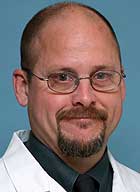The Department of Medicine’s Division of Hospitalist Medicine, which has grown from five physicians to a staff of 47, is celebrating its 10th year this fall.
Hospitalists are physicians who specialize in the care of patients in the hospital. They usually have trained in internal medicine, family practice or pediatrics.

Thoelke
Most often, hospitalists treat patients referred by their primary-care physicians. This step allows primary-care doctors to leave their hospitalized patients in the care of physicians at the hospital who can be reached 24 hours a day.
Hospitalists also monitor patients who don’t have primary-care doctors, act as attending physicians on the oncology service and provide a hospital-wide consult service to fellow physicians.
“This model provides excellent care for patients, as we’re around throughout the day to provide patient care and to provide updates to the families,” said Mark S. Thoelke, M.D., associate professor of medicine and clinical director of the BJC hospitalist service. “It also has been well received by physicians in the community.”
Donald Skor, M.D., a local endocrinologist who uses the hospitalist service at Barnes-Jewish Hospital, is pleased with the results.
“I think we’re fortunate that the hospitalist program at Washington University Medical Center is very good,” Skor said. “This is a well-trained group, and they communicate well with me.”
The hospitalist trend, which has grown rapidly in the United States in the past 10 years, has its roots in the United Kingdom and Canada. Thoelke said the demand for hospitalists has increased as community physicians become more focused on outpatient clinics. As a result, commuting to and from the hospital has become less cost- and time-efficient.
“This is the fastest growing specialty in internal medicine, and I feel fortunate to be a part of this growth,” Thoelke said. “I strongly believe this service provides added value to patients and their families.”